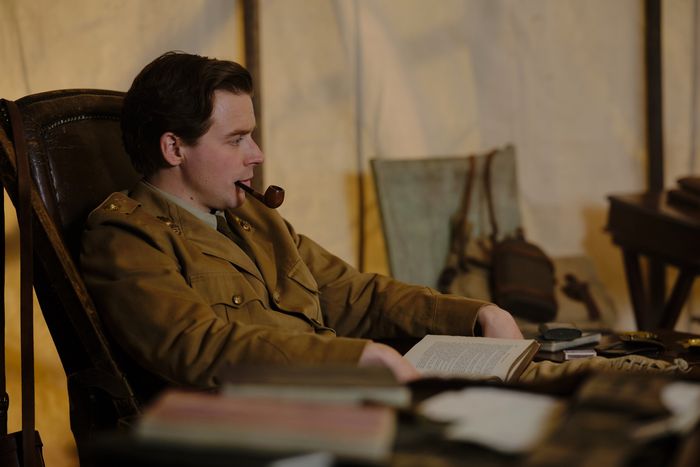
Terence Davies’s Benediction is one of the most restless films of recent years, though you might not notice it at first glance, what with the director’s precise compositions, his deliberate pacing, and the (mostly) restrained performances he coaxes out of his cast. The film follows the life of the British poet Siegfried Sassoon, whose harrowing experiences during WWI led to some of the most beautiful words ever written in the English language as well as a lifelong struggle to connect with others. But to call Benediction a biopic would be giving biopics a bit too much credit. They don’t deserve Benediction.
It would perhaps have been easy to depict Sassoon’s psychological and emotional turmoil directly, through dialogue and lots of anguished wailing. But then this wouldn’t be a Terence Davies film. He is one of the most expressive of directors, but he’s always scratching away at something seemingly inexpressible. Early on in Benediction, we see young Siegfried (Jack Lowden) attend a 1914 performance of Stravinsky’s “The Rite of Spring” and the curtain of the theater rises to reveal a special effect: silent-movie footage of idyllic British scenes, which then gives way to newsreel images of young men signing up for military service, as we hear Sassoon’s poetry in voiceover. We sense the sadness and the gathering doom, of course, but there’s something more here — something in the way the film juxtaposes Stravinsky’s ballet, which after all threw down the gauntlet of modernism, and the then-relatively young medium of cinema alongside Sassoon’s poetry to suggest that the writer’s eventual feelings of loss, meaninglessness, and inadequacy were generational, historic, maybe even metaphysical.
Benediction features many such collage-like moments. Sometimes they convey complicated ideas, sometimes they convey absurdly simple ones. At one point, Davies intercuts images of soldiers on the frontlines with black-and-white images of a herd of cattle thundering over a field. It’s the bluntest, most basic of metaphors, but the director finds uncommon grace in it. The images possess rhythm and beauty, and the Western tune on the soundtrack has a lilting grandeur. There isn’t a lazy note in the film.
Much of Benediction follows Sassoon’s passionate love affairs with men, most notably the famous actor and singer Ivor Novello (played by Jeremy Irvine, who looks like he was carved out of marble) and the nobleman Stephen Tennant (played by Calam Lynch, who looks like he was carved out of porcelain). There’s an emotional imbalance to the relationships: Siegfried falls hard for these men, who seem to drift easily and confidently through a world of endless vanity and constant couplings. But their world is, by necessity, sparse, chilly, and almost always interior; this is, after all, still an England where homosexuality is illegal.
Maybe that’s why Benediction, for all its great beauty, feels so stripped-down, so purposefully austere. Save for one devastating moment near the end, Davies rarely moves in for close-ups. He likes to keep his camera fixed at a slight distance, presenting his characters in their environments. But he’s not looking for realism or extraneous detail. The actors often stand still, and deliver their lines with submerged tension. For all their sexual back-and-forth, we sense that these people exist in a reality that would completely collapse with one wrong move.
Or maybe it has already collapsed. A pall of sadness and regret hangs over everything, as it must have for Sassoon himself. Even when the war isn’t mentioned, it always seems to be there. It’s there in his constant longing for companionship, and it’s there in the way that the handsome young Lowden’s face occasionally transforms into the brittle, bitter visage of Peter Capaldi, who plays the older Sassoon, a man stuck in a mostly loveless marriage and who has converted to Catholicism late in life in an effort to commune with something greater than himself.
That searching, that lostness and melancholy, clearly reaches beyond one famous poet. Sassoon’s loneliness could stand in for the immense loneliness of all the generations caught in the endless shockwave of the old world’s blowing its brains out in World War I. But his loneliness, like many others’, was also compounded by a society that refused to accept him as he was. “Why do you hate the modern world so much?” Sassoon’s son asks him at one point, late in life. “Because it’s younger than I am,” the poet responds. It’s a good line — a funny line. But it’s also profoundly sad, because, as Benediction shows, these are the words of a man who never had a world to call his own.
More Movie Reviews
- Fernanda Torres Is a Subtle Marvel in I’m Still Here
- Grand Theft Hamlet Is a Delightful Putting-on-a-Show Documentary
- Presence Is the Best Thing Steven Soderbergh’s Done in Ages


